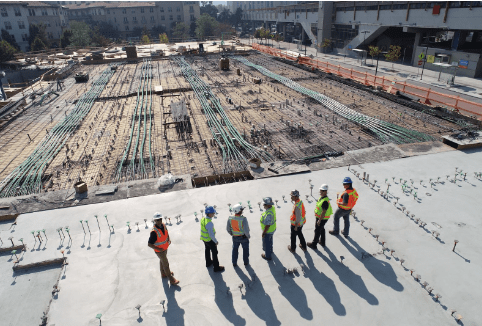
The construction industry may be argued as one of the most physically demanding fields, with workers often facing long hours, outdoor conditions, and physical strain.
While you can mitigate some of these concerns with high-risk life insurance and a good health insurance policy, it’s not a career for everyone.
The construction industry in the United States is forecast to grow by 8.8% in 2022. If you have the drive to succeed and thrive under pressure, this could be the right industry for you.
Here are some of the rewards and risks that come with building a career in construction.
The Rewards of a Career in Construction
This line of work is certainly not without its risks, but it’s also not without rewards. Here are some of the advantages of pursuing a career in construction.
Plenty of Employment and Advancement Opportunities
There’s almost always a job to be found in the construction industry: As of 2022, it employs well over 10 million people.
What’s more, while you’ll often start with the gritty work, there are plenty of merit-based advancement opportunities to be had in working construction.
Specializing in Your Passion
The term “construction” is a broad, all-encompassing term: There are several types of specialties within the construction industry that you can pursue. These include:
- Carpentry
- Electrical work
- Plumbing
- Masonry
- Concrete
- Die-casting
- And more
Most development projects usually require a bit of every specialty, so you’ll rarely find yourself bored on the job.
Higher Salaries
Construction workers can earn excellent salaries, with some positions offering close to six-figure annual pay.
Construction workers also have the potential to earn more if they have special skills and training, such as those who take on managerial roles. An assistant project manager, for instance, could earn up to $84,000 a year depending on the state.
The Risks of a Career in Construction
As rewarding as it may be, a career in construction is not for everyone. Some of the risks of a career in construction include:
Your Schedule May Not Be Ideal
Being a construction worker is extremely demanding, and you’re likely to put in long hours and get called in during inclement weather.
You may also have to be on call and show up to work whenever there’s a project you’re assigned to, and you can expect to work at awkward times like early mornings, weekends, and holidays.
Serious Injuries and Illnesses
Construction workers are also at risk of suffering serious injuries or illnesses due to the nature of their work.
According to the Bureau of Labor Statistics, 308 construction workers were killed on the job in 2020. Some of these deaths were caused by electrocution or falls, while others involved being crushed or caught in heavy machinery.
The risk of injury is heightened by the fact that construction workers operate heavy machinery on a regular basis and use hand tools that can cause serious cuts and lacerations if mistakenly handled.
What types of life insurance do construction workers need?
Construction workers typically face some serious risks as they work on-site. There are a number of policies you can purchase to mitigate the potential risks of a construction career.
If you’re just starting out, though, there’s one particular policy that should be at the top of your list: high-risk life insurance.
High-Risk Life Insurance for Construction Workers
High-risk life insurance is designed for those in careers that place them at a higher risk of death. This includes workers in the construction, transportation, manufacturing, and professional sports industries.
High-risk life insurance is also referred to as hazardous occupation life insurance because it covers those who work in dangerous fields. High-risk life insurance pays to your family in the event that you’re killed on the job.
High-Risk Life Insurance Costs
The cost of high-risk life insurance will differ depending on the insurer, but it is typically more expensive than other types of policies. A lot of this has to do with the fact that construction workers face certain risks and hazards at work that others don’t.
High-risk life insurance premiums are based on the types of work you do and the risks you face. It’s important to shop around for the best rates and coverage available.
The amount of life insurance you need will depend on a variety of factors, including:
- Family size and needs. The size of your family will likely play a role in determining how much life insurance you will need. Your family’s needs may also factor into this decision. For example, if you’re the primary breadwinner, or if your family relies on you for medical care, then you will likely want to take greater precautions.
- Length of coverage. How long do you need to be covered? Do you want coverage for a portion of your life or your whole life?
Do your research and compare quotes before committing to a policy.
Job Prospects for the Future
Construction is one of the most in-demand industries in the United States, with an estimated 360,000 new construction jobs to be created across the country by the year 2030.
This is partly due to the fact that a significant number of aging construction workers will be retiring in the next five years, as well as general industry growth.
Construction Worker vs. General Contractor: Earning Potential and Advancement Opportunities
Construction workers earn excellent salaries and have the potential to earn even more over time. The average construction worker earns around $38,000 annually.
Meanwhile, the average general contractor earns between $70,000 and $95,000 annually.
One of the best ways to advance in the construction industry is to become a general contractor. This means you’ll need to find clients on your own who need construction work done on their properties.
You also need to have enough money in your bank account or savings to fund the project costs.
If you go this route, you’ll need to set up your company as an LLC (limited liability company) or general partnership from the start in order to protect yourself from personal liability.
You may also want to consider hiring an accountant to help you navigate taxes, unemployment benefits, and financial planning.
Is the construction industry right for you?
Technology in the construction industry continues to develop. It will continue to grow and expand in the coming years, which means there will be plenty of job opportunities for new construction workers.
As you consider a career in construction, keep in mind that it’s a very demanding field. You may have to work long hours, on weekends, and during holidays, and you may find yourself dealing with heavy machinery, cuts, lacerations, and other injuries.
But if all this sounds like a good time to you, then construction just might be the perfect career choice.
Luke Williams writes and researches for the insurance comparison site, Clearsurance.com. His passions include insurance and helping others build strong careers.



